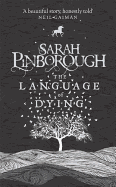
A young woman, recently returned home to care for her dying father, tells a story of family, loss and supernatural visions. She's the middle of five siblings: Penny the anxiously beautiful, Paul the overly successful, Davey and Simon the two sides of the same substance abuse coin. Dad lies in a hospice bed in their old home, struggling with death. The father keeps trying to get out of bed; "terminal agitation," the nurses call it. His movements bring the entire family's mourning to a devastating head, causing the siblings to leave the narrator alone with him.
The Language of Dying is addressed to this foundering patriarch. The narrator has plenty to say to him, to her brothers and sister, and--perhaps most of all--to herself. She's never been sure of her tenuous connection to reality, having seen visions of an impossible beast both in her past and now again as she sits at night in her father's room. It's not a beautiful creature, but something dark, violent and angry. Is this monstrous presence real or imagined? Does it matter? What does it portend?
This short novel is dark and candid, full of conflicting emotions: love, fear, anger, joy. The prose is evocative and moody, making The Language of Dying a perfect novel for those nighttime hours at home when everyone else is fast asleep. The darkness of the storyteller's inner world echoes on every page. --Rob LeFebvre, freelance writer and editor

